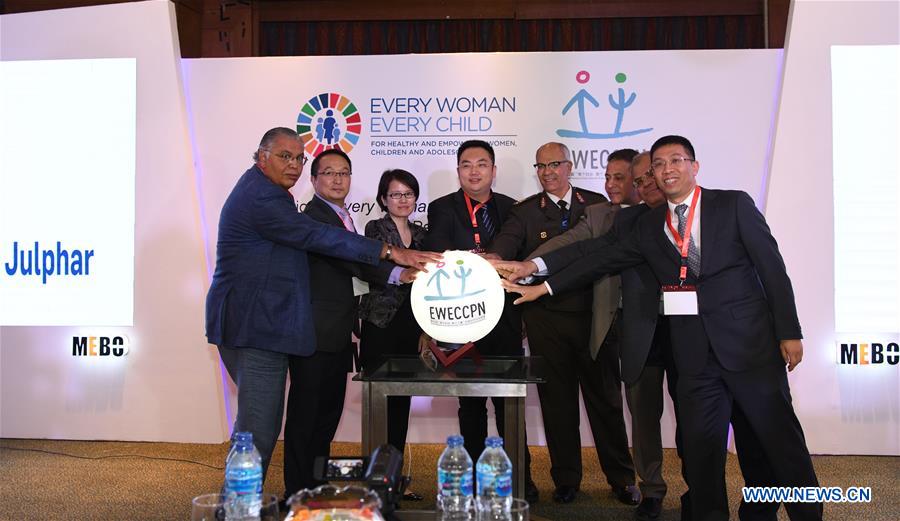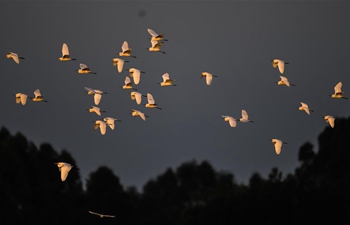
Guests attend the launching ceremony of the UN Every Woman Every Child China Partnership Network Life Regeneration Action Egypt Program in Cairo, Egypt, on Dec. 11, 2018. China's MEBO International launched on Tuesday a program in Egypt under a UN initiative for supporting Egyptian hospitals to treat women and children suffering burns. (Xinhua/Wu Huiwo)
by Marwa Yahya
CAIRO, Dec. 11 (Xinhua) -- China's MEBO International launched on Tuesday a program in Egypt under a UN initiative for supporting Egyptian hospitals to treat women and children suffering burns.
With the program, named UN Every Woman Every Child China Partnership Network Life Regeneration Action Program in Egypt, "MEBO targets at treating around 200 cases and training 2,000 medical staff in eight public hospitals," Kevin P. Xu, chairman of MEBO International, told Xinhua in an interview.
"We are planning to spend 350,000 U.S. dollars and establish eight centers for researches on technology for curing patients of burns in Egypt till the end of 2020," Xu said.
Founded in 1987, MEBO International, which invented the burn regenerative medical technology, has been a pioneer in human body regenerative restoration science.
The company, which has headquarters in China as well as the United States, Thailand, India and Malaysia, focuses on the treatment of burns, wounds, ulcers and skin regeneration. Some of its products include medical and health care products, nutritional supplements, cosmetics and skincare products and medical devices.
Today, over 200,000 doctors from more than 70 countries have applied MEBO's technologies and products in over 20 treatments domains, curing over 40 million patients of burns and wounds.
The MEBO initiative first started with hospitals that have more experience in treating the patients with the MEBO medicine, said Magdy al-Saaty, chairman of the gulf medical company Julphar that manufactures MEBO medicine in the United Arab Emirates (UAE).
"Each country will benefit and gain more experience from the initiative based on the nature of the targeted society," al-Saaty said.
"The initiative will run in stages. The first will start with four public hospitals that have the largest burn units in Cairo, and then will continue in other provinces of Daqahlia, Assuit, and Alexandria," he said.
MEBO will distribute medicine and aid for women and children who are receiving treatment for burns in the targetted hospitals, he added.
The UN initiative Every Woman Every Child was formally launched by former UN Secretary-General Ban Ki-moon in September 2010 with an aim to reduce child mortality and improvement of maternal heath through global collaboration.
In September 2014, the Chinese People's Association for Friendship with Foreign Countries (CPAFFC) announced the co-founding of the China partnership Network as a supportive partner of the UN initiative, and appealed to Chinese companies, civil organizations and academic institutes for cooperation in improving the health of women and children.
In May 2016, MEBO International announced its partnership with the UN initiative for providing supportive medical assistance in Asia and Africa.
"We are committed to putting the global health strategy for women and children into action and alleviating their pain caused by burns," Xu said.
He added that MEBO International will offer its technologies as a significant contribution to improving global quality of life.
Statistics show that 265,000 people, the majority of whom are from low- and middle-income countries, die each year from burns, which rank as the 11th major cause of death for children aged 1-9.
In Africa, the burn mortality rate of children before the age of five is three times that of children around the world.
MEBO International has so far established eight international alliances with different universities on the advancement of regenerated science research, Xu noted.
It aims to build new alliances with some universities in Egypt, he revealed.
MEBO International has been selecting middle-income and developing countries that are in need for medical assistance as partners.
"Last year we worked in Thailand and Malaysia and this year we chose Egypt and Lebanon," said Ji Yongjun, deputy director of the Department of American and Oceanian Affairs of the CPAFFC.
"Our mission is to bridge the Chinese people and the other developing countries in need of medical care," Ji added.











